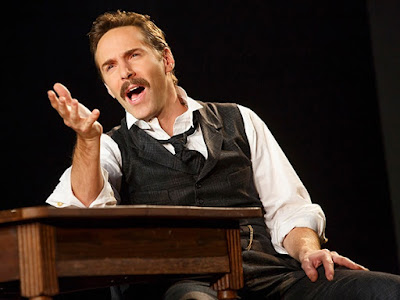That is very much how it felt when entering the Haymarket Theatre with more merchandise on sale than you might expect at a straight play: two different t-shirts, posters, mugs, etc. You don't get that for everyone, Simon Russell Beale would plotz to have such merch on sale!
No, the reason for such buying opportunities is because the titular hero is being played by Bradley Cooper, three-time Academy Award nominee for acting (plus one for producing) and, as I have been informed, a hunk. Personally, he doesn't do a lot for me - he looks like Barry Manilow's better-looking brother but how was he onstage?
Actually he gave a perfectly fine performance as did the imported American cast but as I left the theatre I found myself feeling oddly unmoved and slightly dissatisfied.
I think the fault is with Bernard Pomerance's play as well as Scott Ellis by-the-numbers production. At no time during this production did I feel engaged by Ellis' direction, it felt as if he just followed the stage directions.
Pomerance's play calls for the - usually handsome - actor playing the disfigured Joseph Merrick to perform the role without prosthetics, to suggest the disfigurement through his contorting face and body into the bizarre shape Merrick took. Cooper certainly succeeded in this admirably and he is probably grateful that Pomerance's sadly thin play only lasts two hours - with an interval to unbend in.
Despite sounding at times like David Walliams "I'm a lady" transvestite character from LITTLE BRITAIN, he also captured the humble and sweet nature of the unloved young man who yearned to be educated and liked but here's the rub. The only moment of real audience frisson was when, after a few hidden teases, Cooper was finally revealed in all his buff glory in a pair of grotty pants - I was sitting next to about six 30-something office-worker-women-types who all swooned at him and the one next to me even murmured "Oooo it's HIM". But a couple of seconds later, he morphed into his Merrick gait and the air of disappointment as they realised he was going to stay like that til the curtain call was palpable.
It is certainly a showcase for an actor showing he is more than just a pretty face but that's about it for Pomerance's play. I was shocked at it's thinness, as Peggy Lee might sing "Is That All There Is?" The playwright strives to get us to register that Dr Frederick Treves' attempt to rehabilitate Merrick into his own room at the London Hospital in Whitechapel while having him receive visits from the rich and famous for donations to the Hospital was exploiting Merrick just as his fairground manager had, just to a higher income.
But after a while you want to shake Pomerance and say "Yes we get it, now give me something more!" but we just get more of the same. Scott Ellis's direction seemed to echo the surface appeal of the text and at best got the actors on and off the stage with a pleasing regularity. It mostly seemed to coast along with no real tempo to the later scenes and even the climactic scene of Merrick's decision to sleep lying down knowing this would kill him seemed to have the same uninterested feel.
For all Cooper's contorted perambulations, for me the performances most worth seeing were Alessandro Nivola's as Frederick Treves and Patricia Clarkson as Mrs Madge Kendall, the famous actress who befriends Merrick. Nivola gave a quietly intense performance as Treves, a good man troubled that he is morally wrong in exploiting Merrick and confronting his growing ambivalent feelings towards his charge.
By far the most engaging performance was Patricia Clarkson's as Mrs Kendall, one of the Victorian era's most popular actresses, as adept at Shakespeare as at comedies - indeed she often appeared on the very stage were she was being recreated. Pomerance gives her a couple of funny lines, usually sympathising with Merrick on the pressures of playing a role for a paying public but in a scene that had me quietly squirming in my seat, also had her taking off her blouse to show Merrick his first glimpse of a woman's body. It felt totally gratuitous, especially as they are interrupted by Treves who then acts like a wronged husband. Clarkson transcended the obvious writing to give a light, nuanced performance.
In the all-American company, it was good to see Anthony Heald in his contrasting roles of the censorious Bishop and as Ross, Merrick's fairground manager (even with a dodgy accent): he had a nice scene towards the end when Ross realised his hold over his former money-magnet had gone, and there was a steady performance from Henry Stram as Francis Carr Gomm, chairman of the London Hospital.
There was no chance for over-ovating as Cooper joined the company for ensemble curtain calls at the end which is oddly at variance with the merch onsale out front and I felt a definite air of frustration in the audience - yes, he wants to be just one of the company but it is him that most of the audience have come to see so at least spare them the chance to cheer and whoop him - especially standing up straight and smiling.







No comments:
Post a Comment